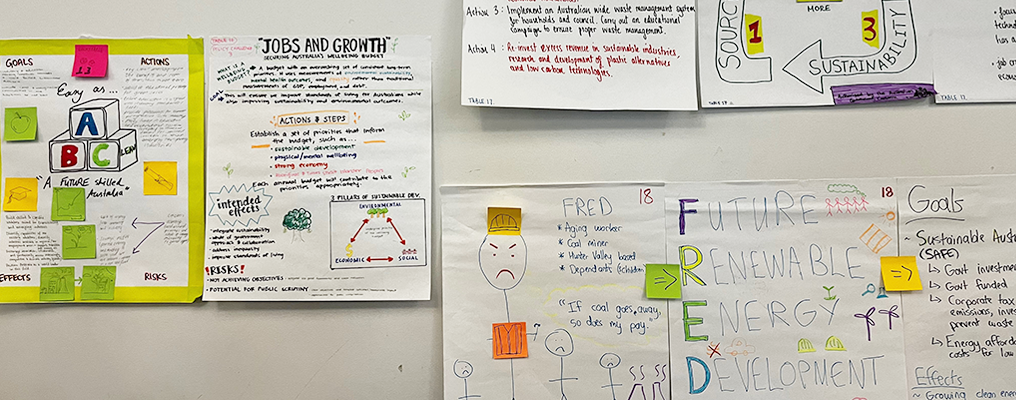ANZSOG policy ‘hackathon’ giving APSC graduates tools and connections
9 November 2022
● News and media
ANZSOG has brought hundreds of Australian Public Service graduates from different departments together to build connections, gain new tools for collaboration and generate new ideas. The two-day policy ‘hackathon’ in Canberra, delivered for the Australian Public Service Commission in partnership with the ANU Futures Hub, supported graduates to channel their energy, enthusiasm and expertise to come up with specific proposals to tackle big-picture policy challenges in an innovative live-action format.
The event – with two separate groups participating over two days – saw 400 graduates put into random groups of seven or eight people to tackle one of the four policy challenges. The groups were taken through a series of structured activities, starting with issue definition, identifying potential options, choosing a preferred option and then refining the solution. All solutions had to be assessed in the light of three alternative futures for Australia in 2030, ranging from a low-growth, low immigration future to a booming economy.
Once the preferred solution was chosen, the groups had one hour to turn them into posters for a final judging. As well as revealing any latent artistic talent in the group, the poster format was chosen to sharpen the graduates’ focus on their key ideas and having a clear message.

“ANZSOG is working closely with the APS Academy to build capability across the public service, across all aspects of the public service craft’’ said Dr Subho Banerjee, formerly an APS Deputy Secretary, and now ANZSOG’s Deputy CEO (Research and Advisory).
“The Hackathon placed a particular emphasis on the role of imagination in good policy advice – being able to think about how the world could be different, what that would mean for the policy context, and what practical and achievable policy actions might help to support better outcomes for people’’
Owen Cooper, Senior Advisor, ANU Futures Hub, was the facilitator of the event and said that the hackathon had taken participants away from their comfort zones and given them a new experience.
“The twin objectives were to help the graduates build networks outside their agencies by working on common task, doing things beyond having a beer together, and to give them some new tools to approach the kind of policy problems that cross over departmental boundaries, which a lot of business-as-usual approaches in the public service aren’t designed to deal with. They assume that any problem fits neatly within the bailiwick of a particular department, and everything grinds to a halt when they don’t,” he said.
“The idea was to give graduates a taste of those problems and some tools they can use in the future.”
The four challenges were chosen based on a recent CSIRO megatrends paper, with the idea being to setup scenarios that generated tensions between potential opportunities and potential problems.

The challenges included balancing the cost of jobs with Australia’s shift to a low-emissions future, how to accelerate the adoption of Artificial Intelligence technologies within government without eroding trust, and how to deal with Australia’s ageing population.
After two years of lockdowns and working with colleagues remotely, bringing hundreds of graduates together in person created a buzz of energy, and graduates enjoyed the chance to work with new people and get different perspectives on the public service and its policy challenges.
Jarod, a graduate with the Department of Defence, said that he had signed up because he wanted a development opportunity that involved working with people at his level from other departments.
“Developing the policies was challenging because it involved a lot of competing inputs, and there always seemed to be more things to consider. You realise that solutions can be unexpected and are not always right in front of you,” he said.
Savannah, a graduate with the Department of Industry and Science said that the hackathon had been a more engaging and interesting way to learn policy skills than a lecture or demonstration, and a way to work with other graduates.
“Good public servants need to be good communicators, and willing to try things without being afraid to fail. The problems we as graduates will work on in the APS are difficult and multi-faceted ones that require lots of people from different backgrounds and perspectives. The vision for the APS is one where departments collaborate more, but collaboration starts on an individual basis with people reaching out to collaborate.”
Mr Cooper said he had been impressed by the enthusiasm the graduates brought to the task and the fresh ideas that had come out of the sessions.
“When you are a more experienced public servant you can see the spiky bits all over the problem and what a nightmare it’s going to be to actually deal with, but they had a willingness to get to grips with the problems without the closed-mindedness that more experienced public servants can have,” he said.
